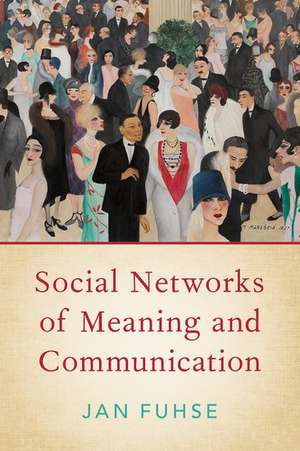Social Networks of Meaning and Communication
Autor Jan Fuhseen Limba Engleză Hardback – 5 ian 2022
Preț: 439.77 lei
Preț vechi: 486.63 lei
-10% Nou
Puncte Express: 660
Preț estimativ în valută:
84.16€ • 87.54$ • 69.48£
84.16€ • 87.54$ • 69.48£
Carte disponibilă
Livrare economică 13-19 martie
Preluare comenzi: 021 569.72.76
Specificații
ISBN-13: 9780190275433
ISBN-10: 019027543X
Pagini: 344
Ilustrații: 16 b/w figures; 4 tables
Dimensiuni: 248 x 162 x 25 mm
Greutate: 0.63 kg
Editura: Oxford University Press
Colecția OUP USA
Locul publicării:New York, United States
ISBN-10: 019027543X
Pagini: 344
Ilustrații: 16 b/w figures; 4 tables
Dimensiuni: 248 x 162 x 25 mm
Greutate: 0.63 kg
Editura: Oxford University Press
Colecția OUP USA
Locul publicării:New York, United States
Recenzii
Jan Fuhse, the leading network theorist in Germany, lays out a theory of social networks that does justice to its cultural and communicative basis. With clarity and a remarkable breadth of view, he unites different forms of networks under a general theory. This masterful book brings insights from systems theory, culture, and philosophical anthropology to the study of social networks. This long-awaited statement will be the starting point for the next generation of network researchers.
Arguing against the conception of networks as stable and unproblematic patterns of relations, Jan Fuhse roots social networks in communication processes and dynamically evolving bundles of interpersonal expectations. This important work, indispensable for advancing network theory, provides deep reflection and a powerful lens for examining contexts ranging from migrant cultures to love as a relationship frame.
Social Networks of Meaning and Communication offers readers a theory of meaningful, informal social networks, enacted through communication. In this book, scholars of culture will find the truly relational account of meaning they've wanted for decades. Fuhse has written a brilliant reference work, theoretical treatise, and measurement manual—all while engaging interesting and clear empirical data to illuminate the work.
The key arguments of the book are Fuhse's...and they are important and well-made arguments that everybody working in relational sociology and/or SNA should take note of and can learn from. The book is a rich source of insights that deserves to be widely read. This is a book that needed writing. Fuhse was the perfect person to write it, and he has made a great job of it. It should make a significant impact.
The idea that societies are vast networks of relations between social actors has a long history in sociology and is currently enjoying something of a renaissance in relational sociology...the central argument of Social Networks of Meaning and Communication by Jan Fuhse is that they comprise "observable regularities in communication" and a "meaning structure" that specifies the identities of participants and related expectations regarding interaction between them.
Arguing against the conception of networks as stable and unproblematic patterns of relations, Jan Fuhse roots social networks in communication processes and dynamically evolving bundles of interpersonal expectations. This important work, indispensable for advancing network theory, provides deep reflection and a powerful lens for examining contexts ranging from migrant cultures to love as a relationship frame.
Social Networks of Meaning and Communication offers readers a theory of meaningful, informal social networks, enacted through communication. In this book, scholars of culture will find the truly relational account of meaning they've wanted for decades. Fuhse has written a brilliant reference work, theoretical treatise, and measurement manual—all while engaging interesting and clear empirical data to illuminate the work.
The key arguments of the book are Fuhse's...and they are important and well-made arguments that everybody working in relational sociology and/or SNA should take note of and can learn from. The book is a rich source of insights that deserves to be widely read. This is a book that needed writing. Fuhse was the perfect person to write it, and he has made a great job of it. It should make a significant impact.
The idea that societies are vast networks of relations between social actors has a long history in sociology and is currently enjoying something of a renaissance in relational sociology...the central argument of Social Networks of Meaning and Communication by Jan Fuhse is that they comprise "observable regularities in communication" and a "meaning structure" that specifies the identities of participants and related expectations regarding interaction between them.
Notă biografică
Jan A. Fuhse is interim professor in sociology at Technical University Chemnitz, Germany, and a senior lecturer (Privatdozent) at Humboldt University. After his PhD in sociology from Universität Stuttgart (Germany) in 2007, he completed a post-doc (funded by the Alexander von Humboldt foundation) at Columbia University 2007-2008. There he worked with Harrison White and Charles Tilly on the theory of social networks. From 2009 to 2013 he was an assistant professor of political sociology at the University of Bielefeld, completing his Habilitation in 2011. From 2013 to 2018, Fuhse worked as a Heisenberg Fellow (funded by the German Research Association) at Humboldt University of Berlin, Germany. From 2019 to 2021, he filled interim professorships in sociology and communication studies at the Universities of Passau and Bremen.
